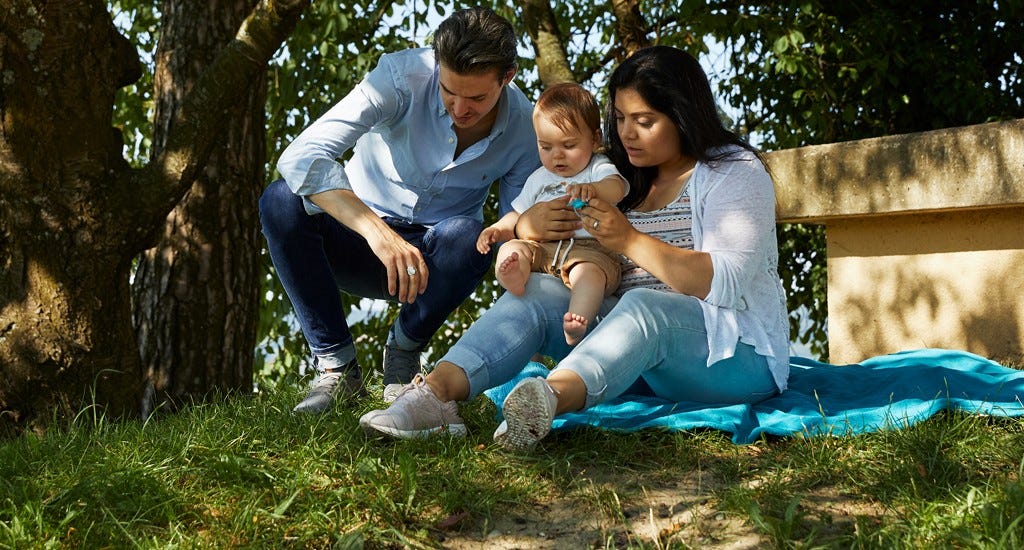Sex after childbirth: when is the right time?
The birth of a child changes everything. This applies to a couple’s sex life, too. When is it OK to have sex again? And how do I get my sex drive back?

The birth of a child turns life upside down, including the parents’ sex life. Some women are reluctant to have sex a few weeks or even months after the birth, while others are keen to get straight back to it, but wonder if it’s safe to do so. And what about contraception?
While the physical changes after childbirth are clear, important psychological and emotional aspects also have to be taken into account when it comes to sex, with the aim of rediscovering desire, trust and self-love.
“A woman can usually tell intuitively when her body is ready for sex again”
How long should you wait to have sex after childbirth?
The question about how long you should wait to have sex after giving birth is complex both physically and emotionally. The general recommendation from gynaecologists is six weeks, when the risk of infection is minimal and the body has normally recovered from the rigours of the birth. “A woman usually feels intuitively when her body is ready for sex again,” says Yvette Plambeck, gynaecologist at the Centre for Interdisciplinary Sexology and Medicine ZiSMed.
But it can take longer for the body to recover – it also depends on the robustness of the tissue, whether you suffered a perineal tear or needed an episiotomy and so on. “It all takes time,” says Plambeck. It is also normal for a woman’s genital area to be drier after birth due to hormones. Lubricant is a good solution in this situation and, above all, listen to your body.
Six weeks is the standard time window from a medical perspective, but the time required to recover emotionally and psychologically is different. “Some women immediately want to have sex again, while others don’t feel like it for weeks or months,” says well-known sexual therapist and author Dania Schiftan.
She explains that the interplay between body, mind and soul is complex – and that the whole system gets out of whack after childbirth. There is no “normal” at her practice and no time-based recommendations. That would put both men and women under pressure.
It is more important, according to Schiftan, to explore the individual circumstances. “You’ve got to take the whole pregnancy into account. Giving birth can be a traumatic experience for a woman that she is not sufficiently prepared for,” says Schiftan. This can damage a woman’s relationship with her genitals and lead to insecurities.
Hormones, fertility and contraception after childbirth
“It can take anything from one to one-and-half years for the body to fully recover from childbirth,” says Plambeck. It takes time – physically and emotionally. So it’s good to take some time before getting pregnant again and having another child. “So using contraception after giving birth is essential.”
There’s no set time when a woman will start menstruating again after the birth. “Some women have their period again after only a month, while others may wait six months,” says Plambeck. But you can’t rely on bleeding alone as a sign of whether or not you can conceive again. “Fertility is limited after childbirth, but the first period would only come two weeks after the first ovulation anyway, so you never have a guarantee.”
Suitable methods of contraception include condoms or the mini pill, although Plambeck warns that pill hormones can be passed into the mother’s milk. And what about the belief that you can’t get pregnant as long as you’re breastfeeding? “The longer and more intensively a woman breastfeeds, the more likely she is not to start her period again,” says Plambeck. “But there’s no guarantee. Breastfeeding alone isn’t a safe method of contraception.”
Lack of sexual desire after childbirth
Hormonal changes can also impact on a woman’s desire for sex. Some women struggle with physical complaints such as dryness or pain, while others are faced with emotional challenges.
“Many women are overwhelmed by all the feelings and touch, and they feel physically strange, as if their body is no longer their own. Their nipples are oversensitive, their body is bigger than they’re used too – it’s a combination of elements,” says sex therapist Schiftan.
Women are faced with huge psychological challenges in their new role. So it’s fine if sex takes a back seat for a while.
However, the key point is whether the lack of desire over time corresponds to a need or an avoidance. “As long as neither partner feels under pressure and both are happy with how things are, there’s no need for action,” says Schiftan. “But if one person in the relationship is unhappy, it’s a good idea to address the issue.”
There are two people in a relationship, so you’ve got to think about your own well-being, but also how you’re doing as a couple. “If there is conflict, you have to talk to each other and get outside help, if necessary. The desire for sex is equally as valid as the desire not to have sex,” says the expert.
Many men also suffer after the birth due to the changes in their relationship with their partner and sexuality.
“How can I find my new body sexy and beautiful as it is now?”
The body changes after pregnancy
The mother builds up an intense physical relationship with the baby, especially in the early days, and so a large part of the woman’s need for closeness is satisfied by the baby. “Women therefore have little or no capacity for extra intimacy,” says Schiftan.
Other reasons why women may be reluctant to have sex after childbirth include physical or emotional injuries, their emotional closeness to their baby, and accepting the physical changes that motherhood brings.
After all, a woman’s body changes significantly during pregnancy and after the birth. “Some things may never return to the way they were, their stomach and breasts may change forever,” explains Schiftan. The body goes through a lot during pregnancy, so women need to learn to find their new body sexy and beautiful as it is.
Schiftan explains that sexuality can play an important role, "But only when I have a positive relationship with my genitals and sex not only creates emotional closeness for me, but also satisfies other needs - for example the need for physical exercise, an orgasm that feels good, and so on."
Some women still lack this sexual learning history today. Many women value closeness and emotional connection more than sexuality. And that’s OK. But after the birth of a child, they then lack other reasons for having sex other than the desire for pleasure.
“Experience shows that a woman finds it easier to rediscover the joy of sex after childbirth if she had not only an emotional connection to sex prior to giving birth but also a physical one, for example she finds touch arousing and knows how to reach orgasm herself,” says Schiftan.
Anyone who needed everything to be perfect before having sex previously is going to find it all the more difficult to get back in touch with their sexuality after the birth of a child. However, it is possible to re-establish this contact and to experience sexuality as a parent in a satisfying way. “The learning history is crucial here,” says Schiftan.
And the good news is that this can be rewritten. The first step is to learn to love yourself again. Become more aware of your own genitals again, accept what has happened, appreciate how much was and is possible – and be able to enjoy it again. In your own way.
Yvette Plambeck is a gynaecologist at the Centre for Interdisciplinary Sexology and Medicine ZiSMed in Zurich.
Dania Schiftan is psychotherapist, author and clinical sex therapist based at a practice in Zurich.


